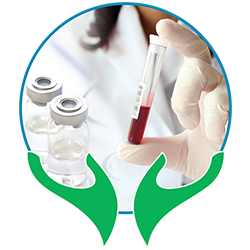-
 Alkaline phosphatase
Alkaline phosphatase Alkaline phosphatase - Parameters: 1
There are several isoenzymes of alkaline phosphatase (ALP), with the largest amounts found in the placenta, kidney, liver, and gut. Diseases of the liver, bones, intestines, and parathyroid glands are diagnosed with ALP, and treatment is monitored. ALP increases are lowest in hepatocellular disease and largest in cholestatic disease, especially in cases of obstructive jaundice and infiltrative disease. ALP is also higher in skeletal system illnesses such as Paget's disease, hyperparathyroidism, rickets and osteomalacia, fractures, and malignant tumours that involve osteoblast hyperactivity and bone remodelling. Sometimes, children's enhanced ALP activity is linked to increased osteoblast activity that follows faster bone growth.
-
 Calcium
Calcium Calcium - Parameters: 1
99 percent of the calcium in the body is found in the bones as hydroxyapatite, making calcium the most common mineral in the body. The leftover calcium is spread throughout the body's tissues and extracellular fluids, where it is essential to numerous functions that support life. Calcium is involved in blood coagulation, neuromuscular conduction, excitability of skeletal and cardiac muscle, enzyme activation, and maintenance of cell membrane integrity and permeability, among other extraskeletal functions. Vitamin D, calcitonin, and parathyroid hormone (PTH) regulate serum calcium levels and, by extension, body content. Serum PTH or vitamin D increases are typically linked to hypercalcemia. Other neoplastic disorders such as multiple myeloma may also be associated with elevated serum calcium levels. In conditions including pancreatitis, nephrosis, and hypoparathyroidism, hypocalcemia may be seen
-
 Creatinine
Creatinine Creatinine - Parameters: 1
The test most frequently used to evaluate renal function is the creatinine assay in serum or plasma. A byproduct of creatine phosphate breakdown in muscle, creatinine is typically produced by the body at a fairly steady rate (dependent on muscle mass). Under normal circumstances, it is not significantly reabsorbed by the tubules after being freely filtered by the glomeruli. Additionally, a tiny but substantial amount is actively secreted.
-
 Ferritin
Ferritin Ferritin - Parameters: 1
Ferritin is a macromolecule that has a molecular weight of at least 440 kD, depending on the amount of iron present. It is composed of an iron core that has an average of about 2500 Fe3+ ions (in liver and spleen ferritin) and a protein shell (apoferritin) with 24 subunits. Ferritin measurement is a useful technique for determining the state of iron metabolism. A representative measurement of the body's iron reserves can be obtained by measuring ferritin at the start of treatment. Early detection is possible when it comes to reticulo-endothelial system (RES) storage deficiencies.
-
 Free Thyroxine
Free Thyroxine Free Thyroxine - Parameters: 1
The primary thyroid hormone that the thyroid gland secretes into the bloodstream is called thyroxine (T4). In conjunction with triiodothyronine (T3), it is essential for controlling the body's metabolic rate, as well as growth, bone metabolism, cardiovascular health, and the proper development of the brain system and gonadal organs. In the bloodstream, T4 is a balanced combination of free and serum-bound hormone. The unbound, physiologically active version of T4 is called free T4 (fT4). One benefit of measuring free T4 is that it remains unaffected by variations in the quantities and characteristics of these binding proteins. In clinical routine diagnostics, free T4 is a helpful tool for determining the thyroid health. If thyroid issues are suspected, it should be examined along with TSH. It can also be used to track the effects of thyrosuppressive medication.
-
 Full Blood Count
Full Blood Count Full Blood Count - Parameters: 1
Full Blood Count
-
 Glucose Fasting
Glucose Fasting Glucose Fasting - Parameters: 1
Glucose Fasting
-
 Iron Studies
Iron Studies Iron Studies - Parameters: 3
Iron Studies
-
 Lipid Profile
Lipid Profile Lipid Profile - Parameters: 6
Lipid Profile
-
 Phosphorus
Phosphorus Phosphorus - Parameters: 1
Phosphorus, an essential mineral, plays a pivotal role in various bodily functions. It contributes to bone health, energy metabolism, and cellular structure. Phosphorus also participates in the formation of DNA and RNA, vital for genetic processes. Our lab offers precise tests to monitor phosphorus levels, ensuring optimal bodily function. Explore the significance of phosphorus and its impact on overall health through our comprehensive laboratory services.
-
 Routine Urine Examination
Routine Urine Examination Routine Urine Examination - Parameters: 1
Routine Urine Examination
-
 Thyroid Stimulating Hormone
Thyroid Stimulating Hormone Thyroid Stimulating Hormone - Parameters: 1
Thyrotropin, also known as thyroid stimulating hormone (TSH), is a glycoprotein made up of two subunits and with a molecular weight of about 30,000 daltons. TSH has a diurnal secretion sequence and is produced in particular basophil cells of the anterior pituitary. The primary regulatory mechanism for the biological action of thyroid hormones is the hypophyseal release of thyrotropic hormone (TSH). TSH has a proliferative effect in addition to boosting thyroid hormone production and secretion at all stages. The first test in thyroid diagnostics is the measurement of TSH. The TSH level responds significantly more strongly to even minute variations in the free thyroid hormone concentrations. As a result, TSH is an extremely sensitive and precise metric for evaluating thyroid function. It is especially well-suited for the early identification or rule-out of illnesses affecting the major regulatory circuit that connects the thyroid, pituitary, and brain.
-
 Urea
Urea Urea - Parameters: 1
The main byproduct of protein nitrogen metabolism is urea. It is created in the liver via the urea cycle from ammonia, which is created by the deamination of amino acids. The majority of urea excretion comes from the kidneys, but small amounts are also expelled through perspiration and broken down by bacteria in the intestines. The most used test for screening renal function is blood urea nitrogen determination. It can help with the differential diagnosis of prerenal, renal, and postrenal azotemia when combined with serum creatinine measurements. Blood urea nitrogen concentrations are elevated in renal-related conditions such as tubular necrosis, glomerular-nephritis (renal causes), shock, reduced blood volume, chronic nephritis, nephrosclerosis, and urinary tract blockage (postrenal causes). Additionally, transient spikes may be observed during times when protein intake is substantial. Liver illnesses are characterised by unpredictable levels.
-
 Vitamin B12
Vitamin B12 Vitamin B12 - Parameters: 1
Vitamin B12, an essential nutrient, plays a key role in various bodily functions, including nerve function, DNA synthesis, and red blood cell formation. Deficiency can lead to fatigue, neurological issues, and anemia. Our laboratory offers accurate testing for Vitamin B12 levels, facilitating early detection and management of deficiency-related conditions. Trust our comprehensive lab services for precise healthcare assessments, ensuring optimal well-being through proper nutrient monitoring.










